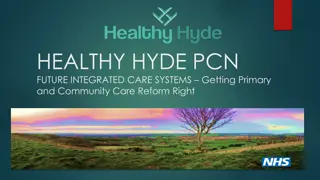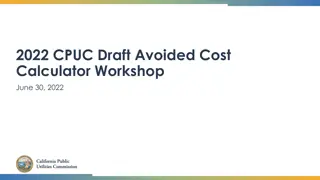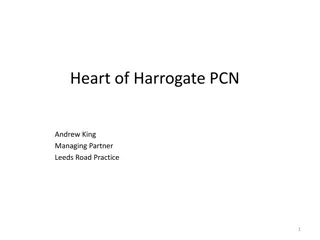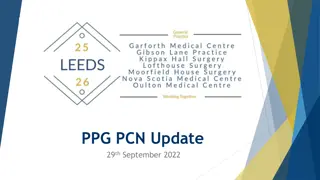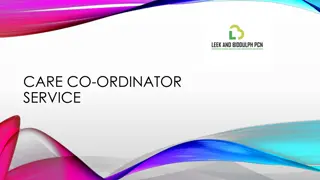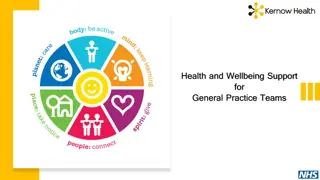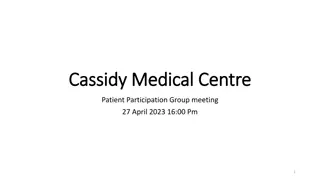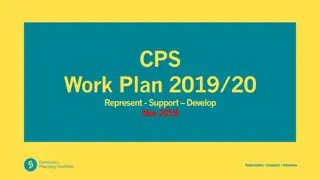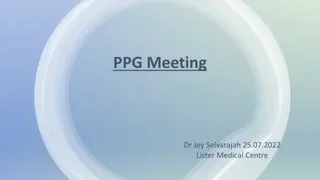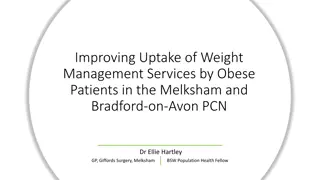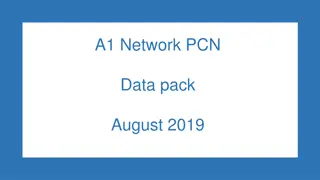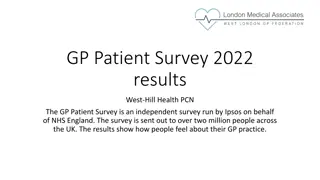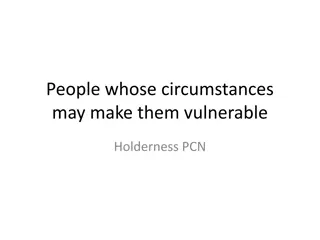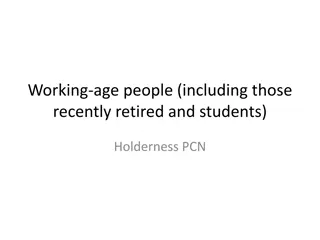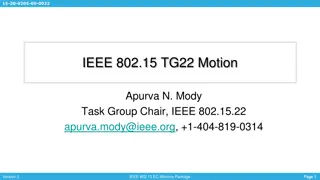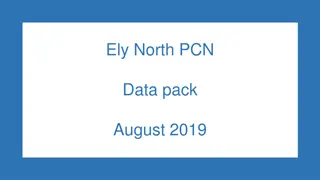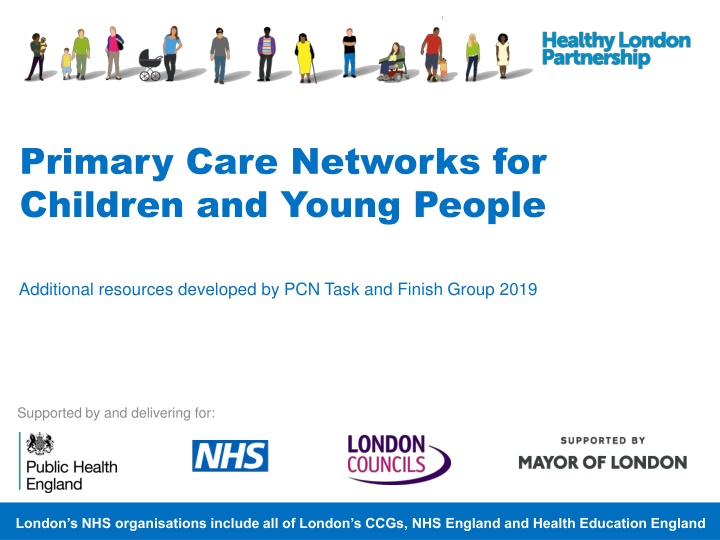
Key Attributes of CYP Model and Principles for Effective Primary Care Networks
Explore the essential principles and key attributes of the Children and Young People (CYP) healthcare model, emphasizing proactive care, patient empowerment, improved access, and collaborative partnerships. Learn how Primary Care Networks are transforming services to better serve CYP needs in alignment with the strategic commissioning framework.
Download Presentation

Please find below an Image/Link to download the presentation.
The content on the website is provided AS IS for your information and personal use only. It may not be sold, licensed, or shared on other websites without obtaining consent from the author. If you encounter any issues during the download, it is possible that the publisher has removed the file from their server.
You are allowed to download the files provided on this website for personal or commercial use, subject to the condition that they are used lawfully. All files are the property of their respective owners.
The content on the website is provided AS IS for your information and personal use only. It may not be sold, licensed, or shared on other websites without obtaining consent from the author.
E N D
Presentation Transcript
Primary Care Networks for Children and Young People Additional resources developed by PCN Task and Finish Group 2019 Supported by and delivering for: London s NHS organisations include all of London s CCGs, NHS England and Health Education England
Principles GP practices want to look after the children and young people in their area, to ensure that they flourish. In order to do this effectively, the environment and needs of the child or young person need to be considered. PCNs need to be aligned to the Next Steps to the Strategic Commissioning Framework, the Long Term Plan and the London Vision: Start Well, Live Well, Age Well. PCNs that work effectively for CYP should provide the start well element of this vision, for primary care and community care. Determining the components of the network from the start is key. Networked care is not just a healthcare system networks must include, for example, schools New workforce roles are needed to ensure the right people treat the patient at the right time. Competencies for roles needs to be consistent The environment created physical or virtual needs to be CYP-friendly There should be a clear local offer that details everything, including social prescribing, available for CYP locally that GPs and others can access easily Higher capacity to deal with CYP at a lower threshold in needed, especially for mental health issues There should be a consistent process and message across the area The system should allow reciprocity across boundaries so that CYP are not limited to accessing care within their locality It should support delivery and training needs of staff 2 Start with children when you develop PCNs and the systems you develop will be transformational and generalisable to other population groups
What does this really mean for CYP? CYP to be seen at a time that suits them and their families: no more missing school CYP and parents to have the tools for self care, leading to fewer appointments and more empowerment of the patient Patient to be at the centre of services rather than attending different services when it suits those services alone Less chance of people slipping through the net as key worker/care navigators co- ordinate patients More skilled staff working together, leading to motivated staff with improved job satisfaction More opportunities for social prescribing Improved links with voluntary sector, local authorities, sexual health and mental health services, and easier to link young patients to these services With shared care record, less need for patient to repeat their story 3
Key attributes of the CYP model Behavioural Citizens / patients as partners / collaborators Moving from reactive to proactive Creating a culture of learning for all patients, professionals Organisational Opportunities to self refer Rapid escalation possible Walk-in clinics for young people same day and same place Same-day access to GP and community and acute paediatricians when necessary Joint clinics between specialists and GPs Potential for observation with appropriate facilities Potential for home visits Risk assessment (eg. using NICE fever, sepsis guidelines) leading to triage (telephone or online) Process should be the same, no matter where the patient presents within the network
PCN linkages and models for CYP The following diagrams show the suggested links that a PCN could form to ensure effective and holistic care for CYP. The content is similar between both types of diagram: the concentric circles indicate professionals or groups who should be included in the immediate team and those who may be linked in as part of a wider multi-disciplinary team, plus key attributes of the system. 5
Draft model: primary care network for CYP with mental health conditions Draft model: primary care network for CYP with mental ill-health
Things I/the network can do to improve care of CYP TODAY 3 6 MONTHS Access to coaching for GPs IT need real time access to data Patient held records Put data sharing agreements in place Upskilling what can someone else do? Eg receptionists, nurses, HCAs Contracting with Trusts paying paediatrician to come into primary care (STP level) Establish practice and community champions Work on leadership pan London, sector, network Involve CYP in co-production, involve voluntary sector Workforce: ensure enough capacity/capability to deliver the ask work sector wide Establish a lead GP for CYP in each practice Involve paediatricians in the formation of PCNs Implement after-school appointments for CYP (cf. Greenwich) Invite patients/parents/carers to talk at study days For complex conditions, start seeing CYP at home or school Phone/email GP/consultant instead of a letter include e-mail address & telephone number on letter/comms/website profiles Repository of key contacts on GP wall/ in phone/paeds office Understand and open up GP availability Actively promote apps eg NHSGo in every consultation Work with and promote the connections you have already Find out who Trust medical directors, PCN directors are and how to work with them Link potential partner agencies into emerging PCN boards Bring teaching/learning opportunities into clinical interactions Find excuses / reasons to visit each others workplaces Start connecting the many people involved in care: start with face to face then reply all cc lists with key professionals Open up chats about permission to behave differently Use first names wherever possible Put photo on NHS.net (via web version) See the next YP I meet alone for part of the consultation Ask them what matters to you? and to bring questions Primary care network for children and young people MEDIUM TERM STOP! Decommission fax machines Ex-novate Don t use letters use e-mail it breaks down barriers. Generic email & phone number for GPs to access specialist care Don t send for info only for action Don t tell, teach. Patients want to understand and self-manage Stop siloed working. Even small steps can help, eg: Show the patient that we work as a team by name- checking their GP or hospital doctor Keep the professional team up to date ask parents who else is involved in their child s care and who would benefit from a copy of their healthcare report Involve the voluntary sector: invite local charities in Get to know other services - arrange a half day exchange with another professional Patch paediatrics: establish a monthly place for education / training /discussion to see professionals face to face, and where families can drop in. Include creche, and have a health visitor available. Multiple ways to access care eg via youth worker not just GP as first point of contact Increase competency & confidence of professionals in PCN increase specialisms in CYP; learning together Empower parents around minor illness management and empower young people Work towards integrated care/primary care/OOH being as trusted as a brand as ED for unplanned care Change job descriptions & contracts (GPs and consultants) Develop new roles then training the workforce 9
Task and finish group information and membership The Task & Finish Group (TFG) met three times in January, March and June 2019. Its work built on ideas and principles previously developed at a workshop in March 2018 and subsequent round-table discussions as part of a Children and Young People s event in June 2018. The list below includes those who attended the TFG and/or the preliminary workshop. Name Affiliation Name Affiliation Sharafat Ali West London NHS Trust Rachel Krausz Northwest London CCGs Dr Stephanie Lamb GP Lambeth and Well Centre, Streatham Dr Oliver Anglin North London Health & Care Partners Dr Eugenia Lee (Chair) GP Greenwich Keziah Bowers NHS Islington CCG Dr Chloe Macaulay Guy s and St Thomas NHS Foundation Trust Dr Fran Cleugh Imperial College Healthcare NHS Trust Suzi McCool North London Health & Care Partners Dr Virginia Davies South London & the Maudsley NHS Foundation Trust Dr Niamh McLaughlin GP Central London Rehan Qureshi Newham CCG Dr Rhiannon England GP City & Hackney Dr Angelika Razzaque GP Lewisham CCG Dr David Finch (Chair) Formerly NW London Medical Director (London Region) NHS England Emma Rigby Association of Young People s Health Sam Rostom North London Health & Care Partners Ronan Fox NHS Redbridge CCG Jonathan Sampson HLP Primary Care Team Dr Jai Ganapathi Hillingdon Hospitals NHS Foundation Trust Mando Watson Imperial College Healthcare NHS Trust Barbara Gaskell Enfield CCG Kirsten Watters Director of Public Health, Southwark Diane Hart Central and NWL NHS Foundation Trust Anne Whately Central London Community Healthcare NHS Trust Dr Jonty Heaversedge Formerly NHS England Dr Ingrid Wolfe Children and Young People s Health Partnership Georgie Herskovits HLP CYP Programme Manager Funmi Worrell HLP Primary Care Programme Manager Christine Kirkpatrick HLP CYP Programme Manager Dr Bob Klaber Imperial College Healthcare NHS Trust Geralyn Wynne Northwest London STP
More information Further information can be found on the primary care toolkit Please contact the programme team with any additional queries: hlp.cyp-programme@nhs.net

